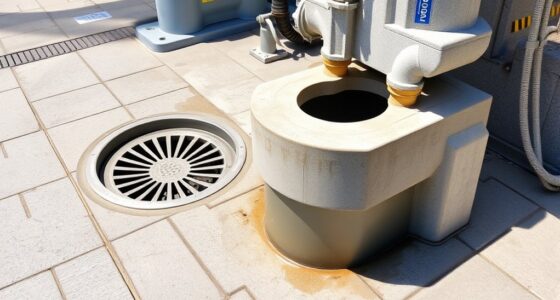To heat your infinity pool, you can choose from gas, electric, solar, or heat pump options, each with different costs and efficiencies. Gas heaters heat quickly but can be expensive to run over time. Electric options are precise but have high energy costs. Solar systems are eco-friendly and cheap to operate but need sunny weather and higher upfront investment. Heat pumps offer a good balance of efficiency and cost for year-round use. Keep exploring to find the best fit for your needs.
Key Takeaways
- Solar pool heaters offer eco-friendly, low-cost operation but require high initial investment and sunny conditions.
- Heat pumps are energy-efficient, suitable for year-round use, and have moderate upfront and operating costs.
- Gas heaters provide rapid heating and are ideal for immediate temperature boosts, though they incur higher ongoing expenses.
- Electric resistance heaters deliver precise temperature control with quick heating but result in higher energy costs.
- Proper system sizing and local climate considerations are essential to optimize costs and performance for infinity pool heating.
Traditional Gas Heaters
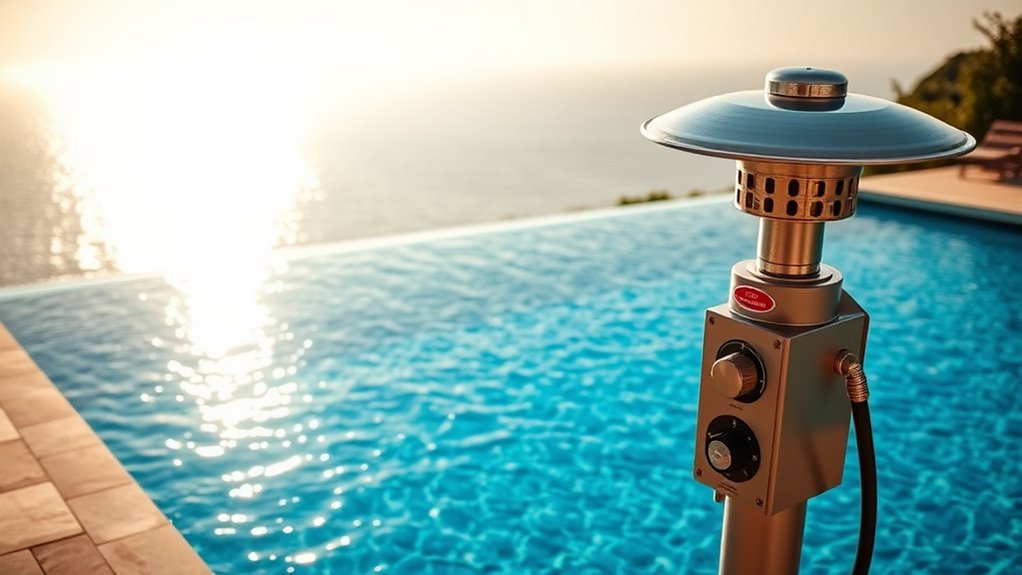
Are traditional gas heaters still a popular choice for heating infinity pools? Many pool owners prefer them because they heat water quickly and reliably. Gas heaters work well in colder climates or when you need rapid temperature boosts. They are generally portable and can be installed in various locations, giving you flexibility. However, they do have higher operating costs compared to other options, mainly due to the price of natural gas or propane. Maintenance can also be more involved, with regular checks needed for fuel lines and burners. Despite these factors, gas heaters remain a favored choice for those who prioritize fast heating and consistent performance. They’re especially practical for occasional use or in situations where quick warm-up times are necessary. Understanding security measures is also important to protect your equipment from cyber threats.
Electric Resistance Heaters
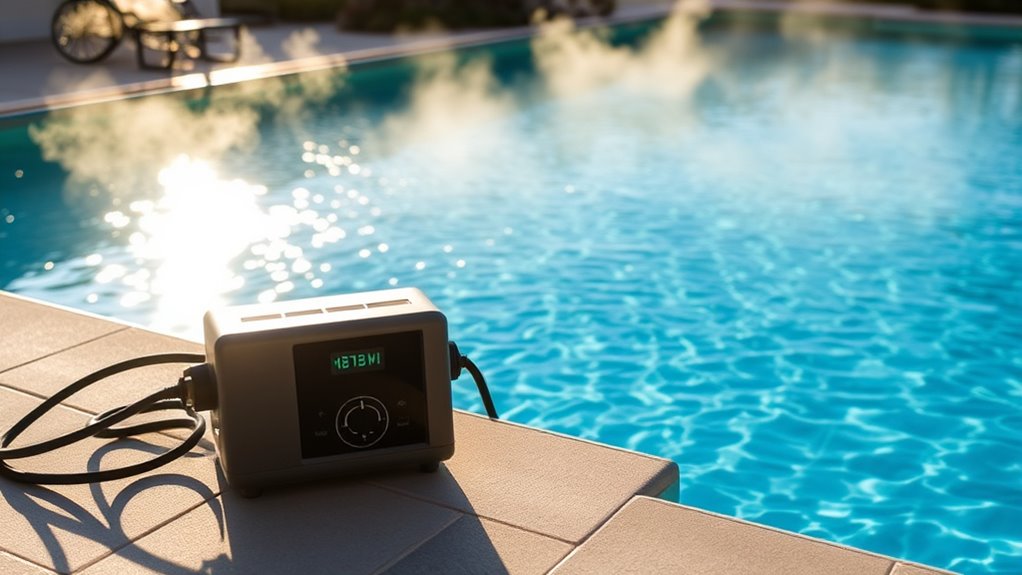
Electric resistance heaters are a straightforward and convenient option for heating infinity pools, especially if you want precise control over water temperature. These heaters work by passing electrical current through resistive elements, generating heat directly into the water. They heat quickly and maintain consistent temperatures, making them ideal for year-round use. Installation is relatively simple, often requiring minimal infrastructure. However, keep in mind that operating costs can be high, especially if you run the heater for long periods or in colder climates. Electric resistance heaters are more suitable for smaller pools or as a backup heating method. They offer reliable performance and easy temperature adjustments, giving you comfort and control without complex setups. Still, consider your energy costs before choosing this option for larger pools. Additionally, understanding the power efficiency of these heaters can help you manage ongoing expenses more effectively.
Solar Pool Heating Systems
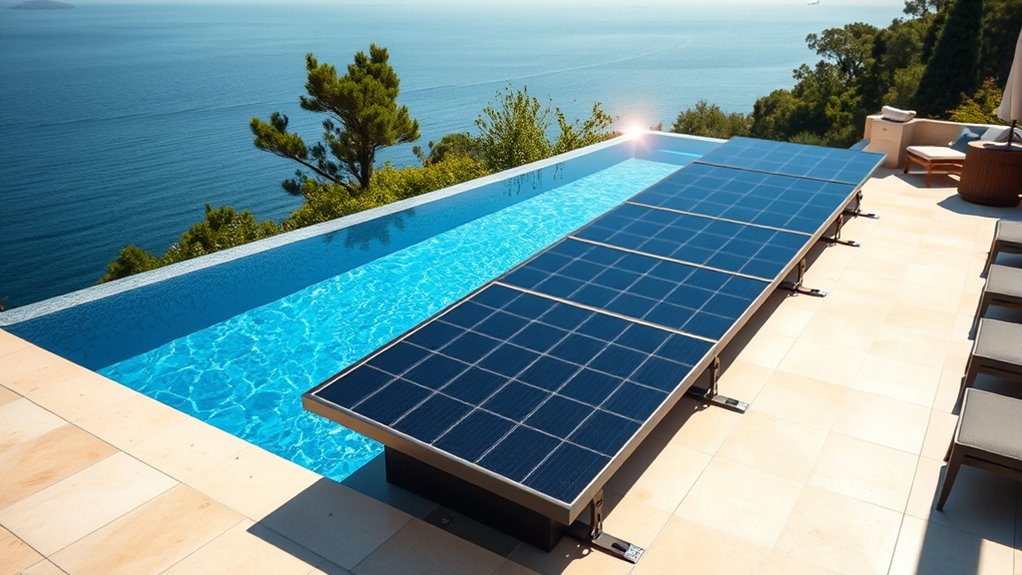
Solar pool heating systems harness the sun’s energy to warm your infinity pool naturally and sustainably. You install solar collectors, usually on your roof or nearby, to capture sunlight and transfer heat to your pool water. This method is eco-friendly, reducing your reliance on electricity or gas, and can markedly lower your operating costs over time. Solar heating works best in sunny climates and for pools used during warmer months. The upfront investment includes the cost of collectors, controllers, and installation, but it pays off with minimal ongoing expenses. Maintenance is simple—regularly check for leaks or debris. While it may not provide rapid heating or work efficiently during cloudy days, solar systems offer a long-lasting, cost-effective, and environmentally conscious way to keep your infinity pool inviting. Incorporating total-cost clarity into your planning can help you understand the long-term financial benefits of solar heating systems.
Heat Pumps
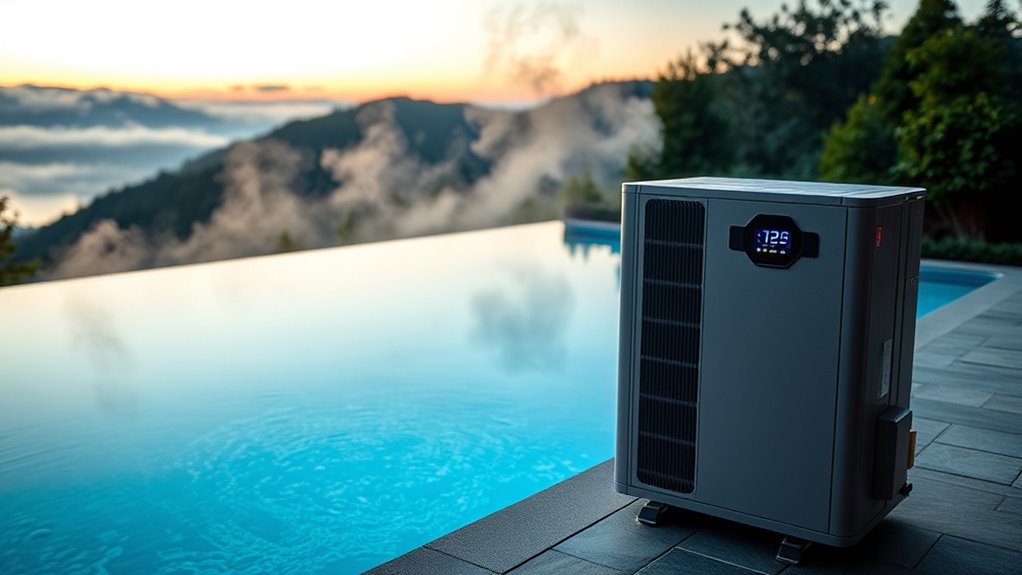
Heat pumps offer an efficient way to warm your infinity pool by transferring heat from the air outside to the water. They work by extracting warmth from the surrounding air, even in cooler temperatures, and using it to heat your pool. This makes them a popular choice for those seeking cost-effective and eco-friendly heating.
Here are some key points to consider:
- They typically operate quietly, so your pool stays warm without much noise.
- They can be used year-round in mild climates, extending your swimming season.
- Their energy efficiency often results in lower operating costs compared to traditional heaters.
- Proper sizing and installation are vital to maximize performance and lifespan.
Heat pumps are a reliable, eco-friendly option that keeps your infinity pool comfortably warm.
Cost Comparison and Considerations
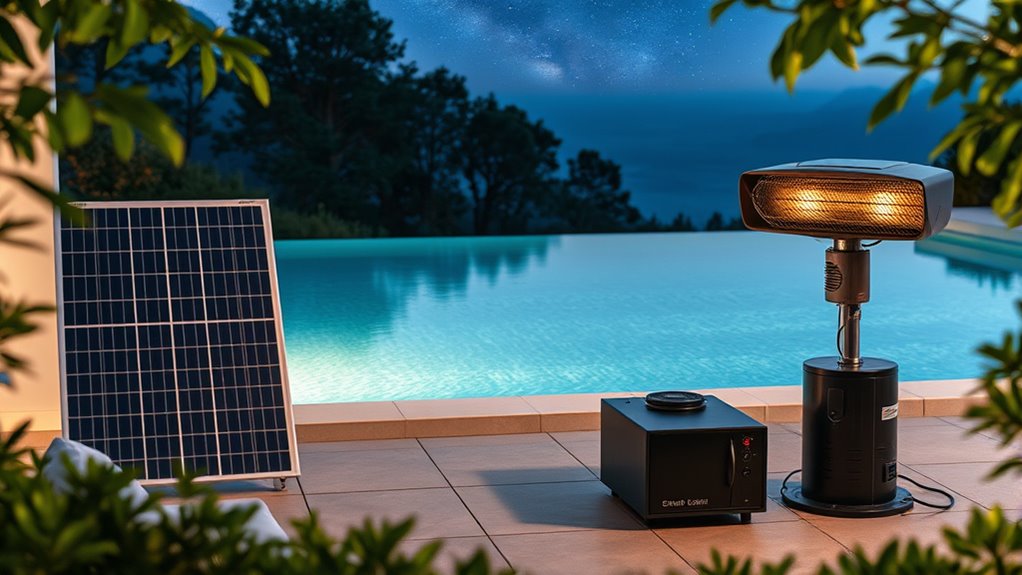
When comparing the costs of heating your infinity pool, it’s important to contemplate both initial expenses and ongoing energy bills. While solar heaters have low operating costs, they require a significant upfront investment and depend on sunlight. Heat pumps are more affordable initially and offer efficient operation, but their costs vary based on capacity and brand. Gas heaters offer quick heating and are ideal for occasional use, but they tend to be more expensive to run over time. Electric resistance heaters provide rapid heating but have high energy costs, making them less suitable for long-term use. When choosing a system, consider your budget, usage frequency, and climate. Balancing upfront costs with ongoing expenses helps you select the most economical and effective heating option for your infinity pool. Additionally, understanding the effectiveness of energy-efficient options can help you make more informed decisions.
Frequently Asked Questions
How Long Does It Take to Heat an Infinity Pool?
It typically takes 8 to 12 hours to heat an infinity pool, depending on its size, starting temperature, and the heating method you select. If you’re using a high-powered heat pump or gas heater, you’ll see faster results. Keep in mind, maintaining the desired temperature necessitates ongoing effort, so planning ahead ensures your pool’s perfect for relaxing or entertaining whenever you want.
Can I Use a Combination of Heating Options?
Yes, you can definitely use a combination of heating options for your infinity pool. Many pool owners blend a solar heater with a gas or electric heater to optimize efficiency and temperature control. This setup allows you to save on energy costs by primarily relying on solar power when available, while using the backup system during colder months or cloudy days. Mixing options gives you greater flexibility and comfort.
What Maintenance Is Required for Different Heating Systems?
You need to regularly inspect and clean your heating system, regardless of type. For gas or propane heaters, check for leaks and verify proper ventilation. Electric systems require minimal maintenance but should be checked for wiring issues. Solar heaters need seasonal cleaning of panels and fluid levels. Regularly service your heater annually, replace filters, and monitor for corrosion or mineral buildup to keep it running efficiently and extend its lifespan.
Are There Environmental Impacts Associated With Each Heating Method?
Like a whisper carried by the wind, environmental impacts vary with each heating method. Electric heating taps into cleaner energy sources but can strain the grid, while gas heaters release emissions that tarnish the air’s purity. Solar heating, a gentle dawn, offers a sustainable glow, yet depends on sunlight. You must weigh these echoes of nature’s balance, choosing a path that harmonizes comfort with the planet’s well-being.
How Does Local Climate Affect Heating Efficiency and Costs?
Your local climate considerably impacts how efficiently you can heat your infinity pool and the associated costs. If you live in a warm climate, maintaining the water temperature requires less energy, saving you money. Conversely, colder regions demand more heating, increasing your costs. Windy or shaded areas can also reduce efficiency. To optimize, choose a heating method suited to your climate and consider adding insulation or covers to reduce heat loss.
Conclusion
Choosing the right heating option for your infinity pool depends on your budget, energy preferences, and climate. Each method has its pros and cons, so weigh them carefully. Remember, “you get what you pay for,” but investing wisely can save you long-term costs and energy. With a bit of research, you’ll find the perfect balance between comfort and efficiency, ensuring your pool stays inviting season after season.



